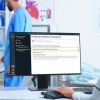A few months ago, I ruptured my plantar fasciitis. After wearing a boot for eight long weeks and receiving shock therapy, I was finally cleared to start working out again. I felt good and strong, so I wanted to continue my efforts while at a conference. Last week, I attempted my routine at the hotel gym, only to pull my gluteal muscle. Little did I know this incident would lead to inflammation pressing against my sciatic nerve, introducing me to the excruciating pain of sciatica and an unexpected comparison of two distinct healthcare experiences.

Leaning against the wall for over an hour at Hospital A.
The first hospital I visited in New Orleans, let's call it Hospital A, offered a refreshing approach to patient care. The physician performed a comprehensive examination, taking the time to understand my symptoms and medical history. I don't know if they used a clinical decision support system, but they essentially followed what I saw on Dr. Google, which facilitated a thorough evaluation of my condition. A clinical decision support system provides physicians with relevant clinical information, aids in diagnosing, adheres to clinical guidelines, and suggests appropriate interventions.
I would think with the help of this decision support system, the physician at Hospital A was able to prescribe a pain management plan tailored specifically to my needs. They explained each step of the treatment process, ensuring I understood what was happening and why. This proactive, patient-centered approach not only provided relief from my physical discomfort but also eased my anxiety about the situation, especially since I was not at home nor had family close by.
Being a patient is awful
In contrast, my experience at Hospital B in San Antonio was less than satisfactory. There was no comprehensive examination, no discussion about my pain or a review of my medications. Instead, I was quickly prescribed steroids and given a Toradol shot. It was evident that their EHR system lacked a clinical decision support component or did not bother to look at it, resulting in a rushed and impersonal approach to care. The ER physician assistant appeared to be incredulous when I described my treatment plan at the other hospital. I brought my discharge summary with me for them to review, and he refused to look at it. He also quirked "my treatment at Hospital A was wildly inappropriate".
The stark difference between these two experiences highlighted the importance of clinical decision support systems embedded and utilized in EHRs. They are not just tools for clinicians; they significantly impact the patient experience by enabling personalized, informed care and adhering to the most up-to-date clinical guidelines.
My experience at Hospital A exemplifies how technology can enhance healthcare delivery. By leveraging clinical decision support systems, healthcare providers can offer more standardized diagnoses, effective treatments, and better patient engagement.
On the other hand, Hospital B's approach underscored the gaps that exist when such technology is absent or not utilized. The lack of a decision support system resulted in a less thorough assessment of my condition and a general feeling of being dismissed rather than treated. Aesthetically, Hospital B was much nicer as it less than 5 years old and looks modern. However, none of that matters if the care is not consistent or adheres to best practices.
My experiences at these two hospitals underscore the urgent need for widespread adoption of clinical decision-support systems in EHRs. Such systems are crucial in facilitating high-quality, patient-centered care - something every individual deserves when stepping into a healthcare setting. My sciatic pain will heal, but my disappointment with Hospital B will not.
Author:
Chani Cordero FACHE, FCHIME, FHIMSSChani Cordero FACHE, FCHIME, FHIMSS
Chief Information Officer at Brooke Army Medical Center
Source & Image Credit: Chani Takes















